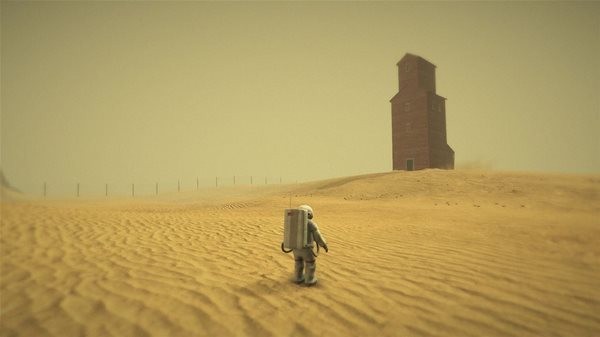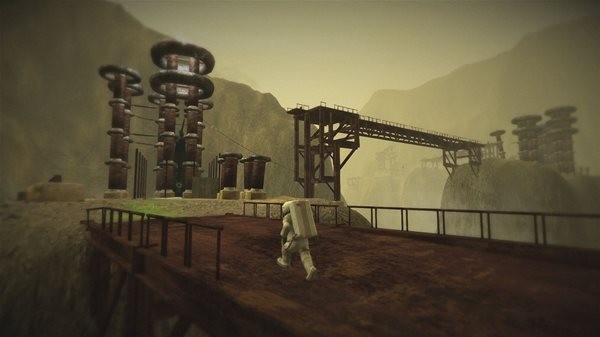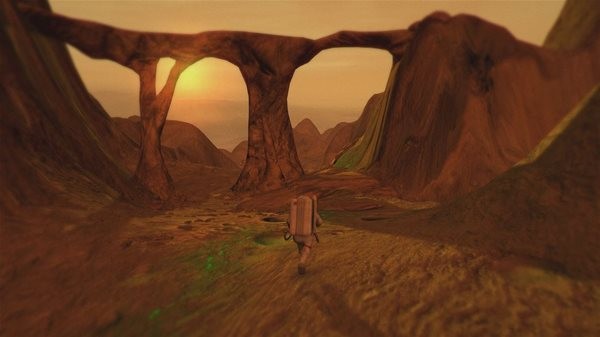Also On: PC
Publisher: Stage 2 Studios
Developer: Stage 2 Studios
Medium: Digital
Players: 1
Online: No
ESRB: T
A lot of AAA games aspire to be “cinematic”. Uncharted, Assassin’s Creed, Ryse, God of War: all of them (and many others like them) want to be thought them not simply as games, but as quasi-movies in their scope and ambition. Out of that desire, you get epic stories, dazzling graphics, cutscenes and large-scale action sequences that seem lifted straight out of a Hollywood blockbusters, etc. It’s a fact, for better and for worse, of modern gaming. And yet, for all that those “cinematic” AAA games are trying to achieve, for all the time and money that went into creating those games (sorry, “experiences”), it’s quite possible that Lifeless Planet comes closer to accomplishing it than anything else I’ve ever played.
Impressively, it does so without the aid of big set pieces or expensive-looking cutscenes. In fact, it does so without any of the usual trappings of those other “cinematic” aspirants: there’s no combat, barely any sign of enemies, and the main character is pretty much a blank slate.
So how does Lifeless Planet do it? By taking a page from the likes of Moon, Alien, and 2001: A Space Odyssey, and focusing largely on mood and atmosphere over fast-paced action. As you walk around the titular planet, you aren’t constantly fighting off aliens or uncovering amazing treasures. Instead, you’re mainly just roaming the deserted landscape, trying to piece together what happened both to your crewmates and to the abandoned Soviet civilization that was apparently wiped out before you even arrived. You occasionally glimpse a single alien being in the distance, but for the most part you’re just walking and uncovering scraps of paper, and solving the occasional (very easy) puzzle.
Mainly walking, though. So much walking. Walking over badlands and wastelands, walking through tunnels and over power lines, walking through empty villages and abandoned warehouses. Walking, walking, walking, with the occasional jump thrown in for good measure.
It’s about as exciting as you’d expect, unfortunately. Lifeless Planet may evoke those cinematic classics, but it also shows the difficulty in translating them to game form. Movies like 2001 and Moon and Alien worked because they had stories to tell, and they told them in a relatively streamlined fashion. They would have been a lot less effective if they featured every little action Sam Rockwell or Sigourney Weaver or Keir Dullea took. The movies were concerned with Points A and B, not every single step their protagonists took getting from one to the other.
And that’s where Lifeless Planet falls short of its goal — because it does seem to show pretty much every single step in its journey. Not only that, all those steps take place along a very clearly predetermined path and lead to puzzles that aren’t particularly challenging, which means that the ominous, mysterious atmosphere the game tries so hard to foster is let down by rather uninspired gameplay.
I don’t want to diminish that atmosphere, though, since I’ve played very few games that come close to matching what Lifeless Planet achieves here. It’s a game that manages to convey not just the sense of isolation you’d get from being alone on a seemingly empty planet, but also the claustrophobia you’d get from experiencing it all inside the confines of a spacesuit with a rapidly diminishing energy supply. On top of that, it knows how to use sound; it doesn’t have an obtrusive score, but it has one that makes you notice it when you need to. It rounds it all out with visuals that seem oddly dreamlike, yet at the same time, pretty impressive (especially if we’re talking indie games).
It’s a shame, then, that it doesn’t have the gameplay to match. For everything else Lifeless Planet does well, there’s no avoiding that unfortunate truth. As a cinematic experience, it’s interesting, but as a game — which, really, is the level that matters — it’s just not as engaging as it needs to be.




